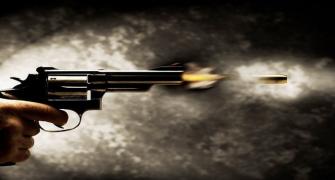In the country of his origin he is famous as the NRIs who revolutionised Indian telecommunications systems. Although living in Chicago, Pitroda heads the ambitious Knowledge Commission, an initiative of Prime Minister Manmohan Singh, in New Delhi and sometimes advises his friend's son Rahul Gandhi on many matters including technology-driven development.
Here Pitroda talks about what could and should be the agenda of Barack Obama if he is elected for the world's top job. Pitroda also believes Obama's idealism will face the test of realism sooner than later.
Obama has created waves in the last one year, and most people didn't expect this. I think he has shown that there is an alternative. People have high hopes partly because he is young, partly because people are looking for change.
The last eight years have been fairly difficult for the US. Not just because of the Iraq war but also because of the way the economy was handled. People are looking for change. Obama's entry is all about good timing, good candidacy and a great campaign during the primaries.
He could attract the young generation.
If you look at today's situation, it seems like he has an edge over McCain.
Is he going to change America forever? I would say the jury is still out on it.
Society doesn't change based on rhetoric. It takes a lot of time, energy and cycles, even generations. Overall, I think the US is going through difficult times. Housing crisis is one example. Not just economy, even the education system is going through a crisis.
The US enjoyed economic leadership for a long time. In a way the US dictated many of the global policies, but I think globalisation and rise of China and India have changed the dynamics of the financial markets. Demography is going to dictate the destiny of a nation.
I see hope in India mainly because 550 million are below the age of 25. In most places the population is ageing or decreasing. India is going to be a source of major global workforce.
The history of mankind is at a major transitional point. Everything we are doing today is a paradigm of the 19th or early 20th century. Take education or transportation. Who decided that it should take four years to get a degree? Somebody decided 200 years back and we are continuing it. Today, when you think of education you think of duster, chalk, blackboard, teacher, grades, exams or classroom. Technology has changed the learning models.
Today ask anybody how to open a bank account and you will know these kinds of processes were based on a 19th century mindset. What is the role of money, the role of World Bank, the role of IMF? All these decisions that were made after World War don't make any sense anymore.
Internet has changed everything, business models, access... everything in our lives is changing and different. Any local event becomes global instantly. All these have a far-reaching impact and we will have to restructure our institutions.
Today, health and education are expensive and not easily accessible.
So, the US will need a different mindset to restructure education, the health sector and many other things.
I see hope and potential in American youth more so than in just Obama.
I think Obama is a symbol as was Rajiv Gandhi. We saw in Rajiv a hope. No one man is capable of doing things that need to be done in the system. It is the energy of a large number of young people that you channelise to get something done. Iraq and other issues are before Obama but in a larger span of history the main question is, is America under Obama ready to restructure its institutions and change the world?
In America one in every 100th human being is in prison. The US has three million people in prisons. It costs $32,000 per year to keep someone in prison. You have to rethink on ideas like prison. With technology available today for monitoring and surveillance, should we not say, you remain in your house and we will monitor you?
If Obama wins, America should adopt a global agenda and not a 'nation-State' agenda.
A country like America must look at the global scene and not the national scene.
The US has to change its education, health and climate sectors and should lead the world by example. Today nobody is providing global leadership.
I don't know how US Congress will overwhelm Obama if he wins.
Everywhere, when you are campaigning the rhetoric is different than when you get into power. When you get power you have to operate. To get into power you have one set of speeches, and when you get power you have another set of realities. Because you have to balance everything.
You begin making compromises because you want to carry everybody with you.
It has to happen like that even in the case of Obama because that's the reality of the world.
Look at G-8, global trade, energy etc. What has come out of it because of compromises? G-8 must recognise that India and China may not be a part of NATO but you can't move forward without them anymore. Is there a leader who shows global leadership and will accept India and China as a part of G-8?
Any new leader has to be a global leader and not a national leader.
On his or her table there are short term issues like energy, security and economy. Issues like human beings, region, race, colour, Africa, borders and nationality are long term issues waiting for the world vision of a new leader.
Sam Pitroda spoke to Managing Editor Sheela Bhatt in Chicago







